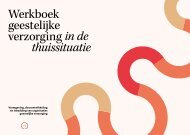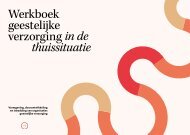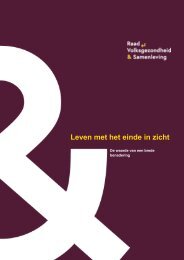Buiten kerk en moskee
Religie in een pluriforme samenleving. Diversiteit en verandering in beeld.
Religie in een pluriforme samenleving. Diversiteit en verandering in beeld.
You also want an ePaper? Increase the reach of your titles
YUMPU automatically turns print PDFs into web optimized ePapers that Google loves.
ing of life) definitely does not mean that today’s spirituals, agnostics and atheists do not<br />
experi<strong>en</strong>ce any meaning (meaning in life). Quite the opposite actually. Self-developm<strong>en</strong>t,<br />
caring for others, partaking in int<strong>en</strong>se experi<strong>en</strong>ces and knowing that one is part of a greater<br />
whole are a few examples of ways in which non-traditional believers give meaning to<br />
their lives.<br />
The individual’s own biography as a yardstick of relevance, the primacy of inner experi<strong>en</strong>ces<br />
and emotions, the breakdown of hierarchical relationships of authority, ever smaller<br />
partial id<strong>en</strong>tities – these are all examples of broad social tr<strong>en</strong>ds that have existed for decades<br />
now and that manifest themselves daily in the most diverse areas of life (for example,<br />
De Hart 2005). Numerous social organisations are experi<strong>en</strong>cing the impact of the<br />
above. They oft<strong>en</strong> have no difficulty interesting people in what they are trying to achieve,<br />
but the same does not apply wh<strong>en</strong> trying to get the same people to commit themselves to<br />
their organisations. The relevance of their projects is not at risk, but their continuity is (for<br />
example, Posthumus et al. 2014).<br />
Where ideology is concerned, developm<strong>en</strong>ts are manifesting themselves via the emerg<strong>en</strong>ce<br />
of a new attitude to religion. Danièle Hervieu-Léger (1999), a Fr<strong>en</strong>ch sociologist specialised<br />
in the sociology of religion, distinguishes betwe<strong>en</strong> what she calls converts (or convertis)<br />
and pilgrims (or pèlerins). The people in the first group have chos<strong>en</strong> for a well-defined<br />
religion, while people from the second group see themselves primarily as individuals who<br />
are on a journey, seeking more significance, seeking meaning that has actually be<strong>en</strong> experi<strong>en</strong>ced.<br />
They may ev<strong>en</strong> be searching for themselves. In an age wh<strong>en</strong> all manner of traditional<br />
religious institutions are crumbling, the latter model is becoming ever more important.<br />
It is not so much about conforming to the rules of an organisation or att<strong>en</strong>ding mass ritual<br />
gatherings in a fixed and prescribed rhythm, but more a matter of a personal spiritual journey<br />
of discovery and sharing the emotional and religious feelings associated with that. It is<br />
about going in search of who you are, on a quest for the core of one’s being. ‘Atman’,<br />
‘γνῶθισεαυτόν’, ‘werde, der du bist’, ‘intra-personal intellig<strong>en</strong>ce’. From the Vedas, Delphi and<br />
Pindaros to Goethe, Nietzsche and contemporary cognitive psychology, they provide a constantly<br />
recurring testimony to an indefatigable desire to know oneself, a desire which is<br />
today acquiring a new topicality – within religious communities, too, but above all beyond<br />
church and mosque.<br />
Not<strong>en</strong><br />
1 The following were some of the characteristics ev<strong>en</strong> lower down on the two lists: Iconoclasm and<br />
Reformation (140 and 158 respectively), Roman Catholicism (148 and 140), Judaism (174 and 160), Islam<br />
(180 and 184) and Buddhism (185 and 183). However, characteristics like ‘humanism’ (163 and 133) and<br />
‘not being religious’ (141 and 134) also scored low as typical characteristics and as reason to feel a connection<br />
with the country and its people. This would seem to indicate ideological disinterest rather than<br />
anti-religious or secular motives. See: Beugelsdijk et al. (2019).<br />
2 Large numbers of Dutch citiz<strong>en</strong>s (still) feel that religion has an important role to play at commemorations<br />
and in response to disaster situations, etc. (Bernts and Berghuijs 2016: 40 et seq.).<br />
165 c o n c l u d i n g r e m a r k s o n t h r e e r e p o r t s










